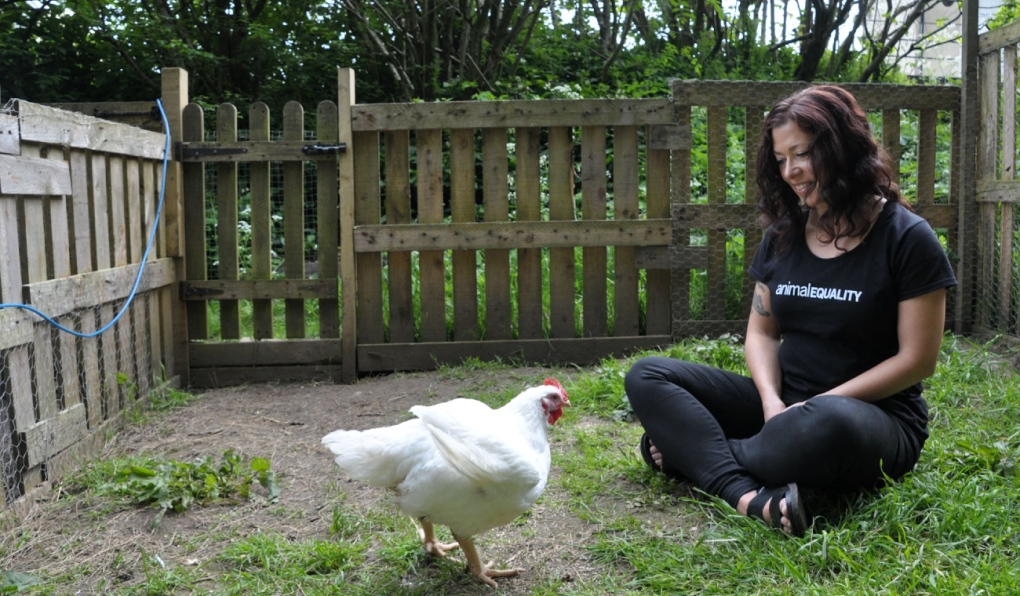Butcher’s daughter from the Sault leads veganism charge
January often sees people change their diet to honour new year’s resolutions and this year, a U.K.-based campaign to convince people to try veganism has an interesting tie to northern Ontario.
Toni Vernelli was born and raised in Sault Ste. Marie, Ont. and with a local butcher for a father, she enjoyed eating meat. Toni Vernelli in an animalEQUALITY t-shirt with a farm chicken. (Taken from Facebook)“I’ve gone from being a butcher’s daughter to the face of one of the biggest vegan campaigns in the world.”
Toni Vernelli in an animalEQUALITY t-shirt with a farm chicken. (Taken from Facebook)“I’ve gone from being a butcher’s daughter to the face of one of the biggest vegan campaigns in the world.”
Growing up on a farm, Vernelli soon realized that the food she was eating was coming from the animals she loved.
The former meat eater made the decision to turn vegan at age 19 and became an animal rights activist.
More than 30 years of animal activism later, Vernelli is now the head of communications for Veganuary, a 31-day pledge that challenges participants to go vegan for the month of January.
The challenge gives people a chance to “dip their toes” in the lifestyle, Vernelli said.
Vegans abstain from consuming any animal products. That means eating no meat, dairy or eggs and for some, extends to not wearing leather or fur or using products tested on animals.
Previously, promoting a plant-based diet was awareness-based, promoting cold-turkey vegetarianism or veganism.
"That's not the way humans operate," Vernelli said.
Historically people love a challenge, she said, pointing to Dry January, a campaign dedicated to giving up alcohol, or Stoptober, when people quit smoking for the month of October.
The challenge started in 2014 in the U.K. and when Veganuary co-founders Jane Land and Matthew Glover decide to create the pledge to go vegan.
“Could we create something that’s good for animals and the planet and human health that’s got that same sort of vibe,” said Glover.
“So we decided to start a campaign where people go vegan for a month.”
Veganuary is now a worldwide movement. Canada is in the top 20 countries by number of participants, ranking 18th.
Now in its tenth year, more than 2 million people have signed up for Veganuary.
Last January alone saw more than 600,000 worldwide join the campaign, which comes with recipes and healthy tips.
Upon signing up, Veganuary pledges will also gain access to a private Facebook group for support from other participants and will receive daily emailed recipes and nutritional tips. Toni Vernelli is the head of comms at Veganuary and holds a PhD in Animal Behaviour. (Taken from Twitter)“Most of our participants change their diet to a degree,” Vernelli said.
Toni Vernelli is the head of comms at Veganuary and holds a PhD in Animal Behaviour. (Taken from Twitter)“Most of our participants change their diet to a degree,” Vernelli said.
“They don’t necessarily all stay vegan, but a quarter say they’re going to stay vegan. But the rest say ‘I’m definitely going to reduce the amount of meat I’m eating and I’m going to incorporate more of these new recipes and foods in my diet.’”
For Vernelli, making the switch to a more plant-focused lifestyle starts with making manageable substitutions.
"Then you can start experimenting with wacky things like quinoa and things you might never have had before."
Nutrition experts told CTV News that that going vegan can be beneficial to some, but not all.
Holistic nutritionist Jaime Brideau said as a general rule, people should avoid what she calls “fad diets.”
If participating, the experts recommend being mindful of not missing out on proteins and to get it from sources such as soy milk, tofu, beans and chickpeas.
“Generally speaking, I don’t recommend it,” said Brideau.
“If you’re used to eating a certain diet for so long and then you’re all of a sudden introducing an entirely different thing, it’s usually your gut that’s going to say ‘hey, this isn’t cool’ and have some issues in there. People generally do get bloated and gassy and have those kinds of complications.”
More information on Veganuary, visit their website.
CTVNews.ca Top Stories

Detractors in Liberal ranks at mercy of Trudeau decision: analyst
As calls mount within the federal Liberal Party for Prime Minister Justin Trudeau to step down as leader, one political analyst says there’s little his detractors can do to force his hand.
2 teenagers arrested, 1 suspect at-large after attack involving bear spray, machete
A pair of teenaged boys have been charged with aggravated assault after police said they attacked a man with bear spray and a machete Friday evening.
Possible explosion at Metro Vancouver strip mall under investigation
Police and firefighters were called to the scene of a potential explosion at a Metro Vancouver strip mall Sunday morning.
A plane crashes and bursts into flames while landing in South Korea, killing 179
A jetliner skidded off a runway, slammed into a concrete fence and burst into flames Sunday in South Korea after its landing gear apparently failed to deploy. All but two of the 181 people on board were killed in one of the country’s worst aviation disasters, officials said.
Looking to get rid of your Christmas tree? This farm will feed it to its goats
Now that the holidays are almost over, many people may be looking to dispose of their Christmas tree. One farm in Massachusetts is letting people do just that, in a furry and eco-friendly way.
'Let's not panic': Canada picks up the pieces after ugly Latvia loss at world juniors
Canada was embarrassed on home soil 3-2 by Latvia — a country it had thumped by a combined 41-4 score across four previous meetings — in a shocking shootout Friday.
4.1 magnitude earthquake in western Quebec felt in Ottawa and Montreal
The earth moved in the Maniwaki area this Sunday morning. No damage was reported after a 4.1 magnitude earthquake rattled the Maniwaki area in western Quebec, according to Earthquakes Canada.
Shark attack at Egyptian Red Sea resort kills 1 foreigner, injures another
A shark attack in Egypt's Red Sea resort town of Marsa Alam has killed one foreigner and injured another, Egypt’s Ministry of Environment said in a statement Sunday.
Rolex stolen from Keanu Reeves' L.A. home turns up in Chile
Police in Chile say they have recovered three watches belonging to 'John Wick' star Keanu Reeves – including a US$9,000 Rolex – that are thought to have been stolen from the actor's Los Angeles home in late 2023.
































